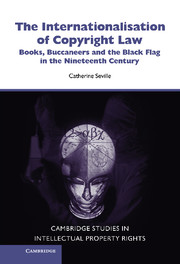 The Internationalisation of Copyright Law
The Internationalisation of Copyright Law Published online by Cambridge University Press: 25 July 2009
The first observation which a study of the existing law suggests is that its form, as distinguished from its substance, seems to us bad. The law is wholly destitute of any sort of arrangement, incomplete, often obscure, and even when it is intelligible upon long study, it is in many parts so ill-expressed that no one who does not give such study to it can expect to understand it.
This was the frank assessment of the 1878 Royal Commission, following its thorough review of ‘Home Copyright’. What is striking about domestic copyright law throughout the second half of the nineteenth century, and even into the beginning of the twentieth century, is how little could be done to address its widely admitted defects. Talfourd's vision even as early as 1837 had been of a grand consolidating bill. He was obliged to curtail his original scheme significantly, and, given the opposition which had been faced, the achievements of the 1842 Act were in one sense considerable. Yet, viewed as a platform which, by default, had to serve for almost seventy years as a basis for Britain's copyright law in a period of rapid economic and intellectual change, the 1842 Act was defective in many ways, and grew yet more so as the century progressed. Fundamental aspects of domestic copyright law were dispersed among numerous statutes which lacked consistency of purpose. Nor was the international sphere adequately addressed, either with regard to Britain's colonies, or to foreign states.
To save this book to your Kindle, first ensure [email protected] is added to your Approved Personal Document E-mail List under your Personal Document Settings on the Manage Your Content and Devices page of your Amazon account. Then enter the ‘name’ part of your Kindle email address below. Find out more about saving to your Kindle.
Note you can select to save to either the @free.kindle.com or @kindle.com variations. ‘@free.kindle.com’ emails are free but can only be saved to your device when it is connected to wi-fi. ‘@kindle.com’ emails can be delivered even when you are not connected to wi-fi, but note that service fees apply.
Find out more about the Kindle Personal Document Service.
To save content items to your account, please confirm that you agree to abide by our usage policies. If this is the first time you use this feature, you will be asked to authorise Cambridge Core to connect with your account. Find out more about saving content to Dropbox.
To save content items to your account, please confirm that you agree to abide by our usage policies. If this is the first time you use this feature, you will be asked to authorise Cambridge Core to connect with your account. Find out more about saving content to Google Drive.